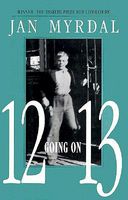- Welcome to FictionDB, Guest
- | My Account
- | Help

12 Going on 13: An Autobiographical Novel — Jan Myrdal

"I am my own person now. I looked Alva right in the eye and said I didn't belong to their family any more, I wasn't a part of it any more. Again they sacrifice us to their political ambitions and talk about their noble principles."
This story took place long before Gunnar Myrdal won the Nobel Prize in Economics and Alva Myrdal won the Nobel Peace Prize. Long before Jan became the notorious "disloyal European," long before his autobiographical novels about childhood shocked Sweden with their scathing portraits of the private life of the founders of Sweden's welfare state. The novels began as scandals and became classics.
Jan Myrdal is twelve going on thirteen. It is 1939, the war in Europe has begun. The war between Jan and his parents continues.
In this autobiographical novel about childhood, Jan Myrdal recreates the look and feel of New York and Stockholm at a turning point in his life and the world's, the outbreak of World War II. He despairs as his parents return him to Sweden, prisoner of a family torn apart by culture, politics and ambition.
Through an uncanny entry into a child's language and experience, Myrdal relives his shame and anger, his awakening sexuality, his escape into an elaborate fantasy system, and his passion for knowing the world -- its people, its machines, its politics.
The story is told without sentimentality or nostalgia, with the language and feeling of a boy open to the sweet and bitter tastes of childhood.
The first of Myrdal's autobiographies about his early years, Childhood, was almost suppressed before it became a best-seller; the next, Another World, won the Grand Prize for the Novel; and Twelve Going on Thirteen won the Esselte Prize for Literature, with 100,000 copies given free to schoolchildren in Sweden. The outspoken critic of "the Swedish model" has become part of the curriculum.
Jan Myrdal is the author of more than 60 books. The titles best known to English readers are Report from a Chinese Village," called "a social classic" by Harrison Salisbury, and the Sixties classic, Confessions of a Disloyal European. One of Sweden's leading intellectuals, he has written political and social commentary, art and literary criticism, novels, poetry, and plays. He has also curated exhibitions, made feature films and TV documentaries, and has edited scholarly editions of Balzac, Diderot and Strindberg. He maintains a controversial presence in Swedish political and cultural life through frequent TV and newspaper commentaries.
This story took place long before Gunnar Myrdal won the Nobel Prize in Economics and Alva Myrdal won the Nobel Peace Prize. Long before Jan became the notorious "disloyal European," long before his autobiographical novels about childhood shocked Sweden with their scathing portraits of the private life of the founders of Sweden's welfare state. The novels began as scandals and became classics.
Jan Myrdal is twelve going on thirteen. It is 1939, the war in Europe has begun. The war between Jan and his parents continues.
In this autobiographical novel about childhood, Jan Myrdal recreates the look and feel of New York and Stockholm at a turning point in his life and the world's, the outbreak of World War II. He despairs as his parents return him to Sweden, prisoner of a family torn apart by culture, politics and ambition.
Through an uncanny entry into a child's language and experience, Myrdal relives his shame and anger, his awakening sexuality, his escape into an elaborate fantasy system, and his passion for knowing the world -- its people, its machines, its politics.
The story is told without sentimentality or nostalgia, with the language and feeling of a boy open to the sweet and bitter tastes of childhood.
The first of Myrdal's autobiographies about his early years, Childhood, was almost suppressed before it became a best-seller; the next, Another World, won the Grand Prize for the Novel; and Twelve Going on Thirteen won the Esselte Prize for Literature, with 100,000 copies given free to schoolchildren in Sweden. The outspoken critic of "the Swedish model" has become part of the curriculum.
Jan Myrdal is the author of more than 60 books. The titles best known to English readers are Report from a Chinese Village," called "a social classic" by Harrison Salisbury, and the Sixties classic, Confessions of a Disloyal European. One of Sweden's leading intellectuals, he has written political and social commentary, art and literary criticism, novels, poetry, and plays. He has also curated exhibitions, made feature films and TV documentaries, and has edited scholarly editions of Balzac, Diderot and Strindberg. He maintains a controversial presence in Swedish political and cultural life through frequent TV and newspaper commentaries.
Genres
Click on any of the links above to see more books like this one.
